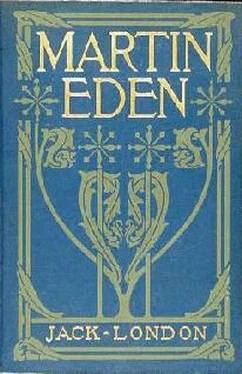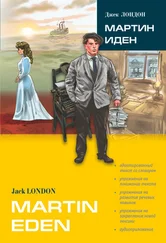He glanced around the table. Opposite him was Arthur, and Arthur’s brother, Norman. They were her brothers, he reminded himself, and his heart warmed toward them. How they loved each other, the members of this family! There flashed into his mind the picture of her mother, of the kiss of greeting, and of the pair of them walking toward him with arms entwined. Not in his world were such displays of affection between parents and children made. It was a revelation of the heights of existence that were attained in the world above. It was the finest thing yet that he had seen in this small glimpse of that world. He was moved deeply by appreciation of it, and his heart was melting with sympathetic tenderness. He had starved for love all his life. His nature craved love. It was an organic demand of his being. Yet he had gone without, and hardened himself in the process. He had not known that he needed love. Nor did he know it now. He merely saw it in operation, and thrilled to it, and thought it fine, and high, and splendid.
He was glad that Mr. Morse was not there. It was difficult enough getting acquainted with her, and her mother, and her brother, Norman. Arthur he already knew somewhat. The father would have been too much for him, he felt sure. It seemed to him that he had never worked so hard in his life. The severest toil was child’s play compared with this. Tiny nodules of moisture stood out on his forehead, and his shirt was wet with sweat from the exertion of doing so many unaccustomed things at once. He had to eat as he had never eaten before, to handle strange tools, to glance surreptitiously about and learn how to accomplish each new thing, to receive the flood of impressions that was pouring in upon him and being mentally annotated and classified; to be conscious of a yearning for her that perturbed him in the form of a dull, aching restlessness; to feel the prod of desire to win to the walk in life whereon she trod, and to have his mind ever and again straying off in speculation and vague plans of how to reach to her. Also, when his secret glance went across to Norman opposite him, or to any one else, to ascertain just what knife or fork was to be used in any particular occasion, that person’s features were seized upon by his mind, which automatically strove to appraise them and to divine what they were-all in relation to her. Then he had to talk, to hear what was said to him and what was said back and forth, and to answer, when it was necessary, with a tongue prone to looseness of speech that required a constant curb. And to add confusion to confusion, there was the servant, an unceasing menace, that appeared noiselessly at his shoulder, a dire Sphinx that propounded puzzles and conundrums demanding instantaneous solution. He was oppressed throughout the meal by the thought of finger-bowls. Irrelevantly, insistently, scores of times, he wondered when they would come on and what they looked like. He had heard of such things, and now, sooner or later, somewhere in the next few minutes, he would see them, sit at table with exalted beings who used them-ay, and he would use them himself. And most important of all, far down and yet always at the surface of his thought, was the problem of how he should comport himself toward these persons. What should his attitude be? He wrestled continually and anxiously with the problem. There were cowardly suggestions that he should make believe, assume a part; and there were still more cowardly suggestions that warned him he would fail in such course, that his nature was not fitted to live up to it, and that he would make a fool of himself.
It was during the first part of the dinner, struggling to decide upon his attitude, that he was very quiet. He did not know that his quietness was giving the lie to Arthur’s words of the day before, when that brother of hers had announced that he was going to bring a wild man home to dinner and for them not to be alarmed, because they would find him an interesting wild man. Martin Eden could not have found it in him, just then, to believe that her brother could be guilty of such treachery-especially when he had been the means of getting this particular brother out of an unpleasant row. So he sat at table, perturbed by his own unfitness and at the same time charmed by all that went on about him. For the first time he realized that eating was something more than a utilitarian function. He was unaware of what he ate. It was merely food. He was feasting his love of beauty at this table where eating was an aesthetic function. It was an intellectual function, too. His mind was stirred. He heard words spoken that were meaningless to him, and other words that he had seen only in books and that no man or woman he had known was of large enough mental caliber to pronounce. When he heard such words dropping carelessly from the lips of the members of this marvellous family, her family, he thrilled with delight. The romance, and beauty, and high vigor of the books were coming true. He was in that rare and blissful state wherein a man sees his dreams stalk out from the crannies of fantasy and become fact.
Never had he been at such an altitude of living, and he kept himself in the background, listening, observing, and pleasuring, replying in reticent monosyllables, saying, "Yes, miss," and "No, miss," to her, and "Yes, ma’am," and "No, ma’am," to her mother. He curbed the impulse, arising out of his sea-training, to say "Yes, sir," and "No, sir," to her brothers. He felt that it would be inappropriate and a confession of inferiority on his part-which would never do if he was to win to her. Also, it was a dictate of his pride. "By God!" he cried to himself, once; "I’m just as good as them, and if they do know lots that I don’t, I could learn ’m a few myself, all the same!" And the next moment, when she or her mother addressed him as "Mr. Eden," his aggressive pride was forgotten, and he was glowing and warm with delight. He was a civilized man, that was what he was, shoulder to shoulder, at dinner, with people he had read about in books. He was in the books himself, adventuring through the printed pages of bound volumes.
But while he belied Arthur’s description, and appeared a gentle lamb rather than a wild man, he was racking his brains for a course of action. He was no gentle lamb, and the part of second fiddle would never do for the high-pitched dominance of his nature. He talked only when he had to, and then his speech was like his walk to the table, filled with jerks and halts as he groped in his polyglot vocabulary for words, debating over words he knew were fit but which he feared he could not pronounce, rejecting other words he knew would not be understood or would be raw and harsh. But all the time he was oppressed by the consciousness that this carefulness of diction was making a booby of him, preventing him from expressing what he had in him. Also, his love of freedom chafed against the restriction in much the same way his neck chafed against the starched fetter of a collar. Besides, he was confident that he could not keep it up. He was by nature powerful of thought and sensibility, and the creative spirit was restive and urgent. He was swiftly mastered by the concept or sensation in him that struggled in birth-throes to receive expression and form, and then he forgot himself and where he was, and the old words-the tools of speech he knew-slipped out.
Once, he declined something from the servant who interrupted and pestered at his shoulder, and he said, shortly and emphatically, "Pew!"
On the instant those at the table were keyed up and expectant, the servant was smugly pleased, and he was wallowing in mortification. But he recovered himself quickly.
"It’s the Kanaka for ‘finish,’" he explained, "and it just come out naturally. It’s spelt p-a-u."
He caught her curious and speculative eyes fixed on his hands, and, being in explanatory mood, he said:-
Читать дальше












